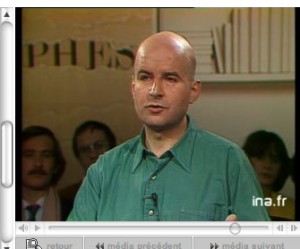Pierre Guyotat on "Apostrophes"
On thursdays, the French daily Libération publishes a link to an audio-visual “fiche media” — today’s link goes to one installment of the most famous French literary TV show, Bernard Pivot’s “Apostrophes,” specifically the show of February 10, 1984. The guests are the usual array of trad novelists presenting their cuvée de l’année product, plus two more interesting writers: Dominique Rolin, the life-long lover of Philippe Sollers (they met when he was barely twenty & she in her late thirties), whose novel is a description of her eventual funeral & who speaks about her discovery — while writing the book — that the soul is all around the body, thus not inside. But by far the most fascinating is the last guest: Pierre Guyotat, the greatest living avant-garde French prosist, who had just published his narrative (not a novel, as he himself insists) “Le Livre” (of which he reads an extract — beautifully, beautifully) and a book of interviews. Totally worthwhile zapping forward to his moments, though interesting to watch the whole thing, swathed as it is in Robert Sabatier’s pipe smoke. And to see the fierce verbal duel between Rolin and a young Patrick Grainville. Here the permalink for the show. (It does take some time to load).


 Poasis II: Selected Poems 2000-2024
Poasis II: Selected Poems 2000-2024 “Todesguge/Deathfugue”
“Todesguge/Deathfugue” “Interglacial Narrows (Poems 1915-2021)”
“Interglacial Narrows (Poems 1915-2021)” “Always the Many, Never the One: Conversations In-between, with Florent Toniello”
“Always the Many, Never the One: Conversations In-between, with Florent Toniello” “Conversations in the Pyrenees”
“Conversations in the Pyrenees” “A Voice Full of Cities: The Collected Essays of Robert Kelly.” Edited by Pierre Joris & Peter Cockelbergh
“A Voice Full of Cities: The Collected Essays of Robert Kelly.” Edited by Pierre Joris & Peter Cockelbergh “An American Suite” (Poems) —Inpatient Press
“An American Suite” (Poems) —Inpatient Press “Arabia (not so) Deserta” : Essays on Maghrebi & Mashreqi Writing & Culture
“Arabia (not so) Deserta” : Essays on Maghrebi & Mashreqi Writing & Culture “Barzakh” (Poems 2000-2012)
“Barzakh” (Poems 2000-2012) “Fox-trails, -tales & -trots”
“Fox-trails, -tales & -trots” “The Agony of I.B.” — A play. Editions PHI & TNL 2016
“The Agony of I.B.” — A play. Editions PHI & TNL 2016 “The Book of U / Le livre des cormorans”
“The Book of U / Le livre des cormorans” “Memory Rose Into Threshold Speech: The Collected Earlier Poetry of Paul Celan”
“Memory Rose Into Threshold Speech: The Collected Earlier Poetry of Paul Celan” “Paul Celan, Microliths They Are, Little Stones”
“Paul Celan, Microliths They Are, Little Stones” “Paul Celan: Breathturn into Timestead-The Collected Later Poetry.” Translated & with commentary by Pierre Joris. Farrar, Straus & Giroux
“Paul Celan: Breathturn into Timestead-The Collected Later Poetry.” Translated & with commentary by Pierre Joris. Farrar, Straus & Giroux